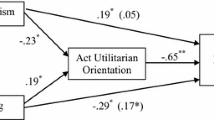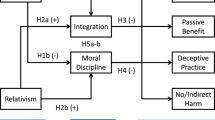Abstract
We live in an increasingly globalizing world, in which countries are closely linked by international trade and investment ties. Cross-cultural comparative studies of national values and ethics have attracted growing research interest in recent years, because shared practices, values and ethical standards depend on shared beliefs. However, the findings of such studies have been unable to reach a consensus on the impact of culture on ethics-related attitudes and behavior. Empirically, many “cross-cultural” differences reported by previous studies might actually stem from cross-national differences. In order to partially fill this gap, this study advocates an analytical framework that isolates the role of cultural and national differences in order to test their relationship to individual level variables. Within this framework, we test␣competing hypotheses based on both cultural and national contexts by comparing groups of Chinese and American respondents together with a “bridging group” of Chinese Chinese-Americans. Theoretically, this contextual approach helps resolve the debate on the role of␣culture, by showing that culture plays a far more important role in shaping value orientations than the national background. Specifically, the two ethnic Chinese groups had many cultural values in common, and differed significantly from the Caucasian group. Implications are discussed.
Similar content being viewed by others
References
Abdolmohammadi M. J., D. R. L. Gabhart, M. F. Reeves: 1997, Ethical Cognition of Business Students Individually and in Groups, Journal of Business Ethics 16(16), 1717–1725
Adler N. J., N. Campbell, A. Laurent: 1989, In Search of Appropriate Methodology: From Outside the People’s Republic of China Looking in, Journal of International Business Studies 20(1), 61–74
Ahmed M. M., K. Y. Chung, J. W. Eichenseher: 2003, Business Students’ Perception of Ethics and Moral Judgment: A Cross-Cultural Study, Journal of Business Ethics 43(1/2), 89–102
Armstrong R. W., J. Sweeney: 1994, Industry Type, Culture, Mode of Entry and Perceptions of International Marketing Ethics Problem: A Cross-Cultural Comparison, Journal of Business Ethics 13(10), 775–785
Bock R. D.: 1975, Multivariate Statistical Methods in Behavioral Research. McGraw-Hill, New York
Borkowski S. C., Y. J. Urgas: 1998, Business Students and Ethics: A Meta-Analysis, Journal of Business Ethics 17(11), 1117–1127
Cambell J. L. 2007. Why Would Corporations Behave in Socially Responsible Ways? An Institutional Theory of Corporate Social Responsibility. Academy of Management Review, 32(3), 946
Cheng J. L. C.: 1994, On the Concept of Universal Knowledge in Organizational Science: Implications for Cross-National Research, Management Science 40(1), 162–168
Child J. D.: 1981, Culture, Contingency and Capitalism in the Cross-National Study of Organizations. In L. L. Cummings, G. M. Staw (Eds.), Research in Organizational Behavior. JAI Publishers, Greenwich, CT
Chung K. Y., J. W. Eichenseher, T. Taniguchi: 2008, Ethical Perceptions of Business Students: Differences Between East Asia and the USA and Among “Confucian” Cultures, Journal of Business Ethics 79(1/2), 121–132
Doney P. M., J. P. Cannon, M. R. Mullen: 1998, Understanding the Influence of National Culture on the Development of Trust, Academy of Management Review 23(3), 601–620
Earley P. C.: 1993, East Meets West Meets Mideast: Further Explanations of Collectivistic and Individualistic Work Groups, Academy of Management Journal 36(2), 319–348
Earley P. C., H. Singh: 1995, International and Intercultural Management Research: What’s Next? Academy of Management Journal 38(2), 327–340
Eisenstadt S. N.: 1973, Tradition, Change and Modernity. Wiley, New York
England G. W., R. Lee: 1974, The Relationship Between Managerial Values and Managerial Success in United States, Japan, India and Australia, Journal of Applied Psychology 59(4), 411–419
Erdener C. B.: 1998, Confucianism and Business Ethics in Contemporary China, International Journal of Management 15(1), 72–78
Eyou M. L., V. Adair, R. Dixon: 2000, Cultural Identity and Psychological Adjustment of Adolescent Chinese Immigrants in New Zealand, Journal of Adolescence 23(5), 531–543
Fukuyama F.: 1995, Trust: The Social Virtues and the Creation of Prosperity. Free Press, New York
Gannon M. J.: 1994, Understanding Global Cultures: Metaphorical Journeys Through 17 Countries. Sage, Thousand Oaks, CA
Harbison F., C. A. Myers: 1959, Management in the Industrial World: An International Analysis. McGraw-Hill, New York
Harvey B.: 1999, “Graceful Merchants”: A Contemporary View of Chinese Business Ethics, Journal of Business Ethics 20(1), 85–92
Hofstede G. H.: 1980, Culture’s Consequences: International Differences in Work-Related Values. Sage, Beverly Hills, CA
Hofstede G. H.: 1991, Cultures and Organizations. McGraw Hill, New York
Hofstede G. H., M. H. Bond: 1988, The Confucius Connection: From Cultural Roots to Economic Growth, Organizational Dynamics, 16(4), 4–21
Hoivik H. W.: 2007, East Meets West: Tacit Messages About Business Ethics in Stories Told by Chinese Managers, Journal of Business Ethics 74(4), 457–469
Jones M.T.: 1999, The Institutional Determinants of Social Responsibility, Journal of Business Ethics 20(2), 163–179
Kahn, H.: 1979, World Economic Development: 1979 and Beyond (Westview Press, Colorado)
Kelley L., C. Reeser: 1973, The Persistence of Culture as a Determinant of Differentiated Attitudes on the Part of American Managers of Japanese Ancestry, Academy of Management Journal 16(1), 67–76
Kelley L., A. Whatley, R. Worthley: 1987, Assessing the Effects of Culture on Managerial Attitudes: A Three-Culture Test, Journal of International Business Studies 18(2), 17–31
Kelly L., R. Worthley: 1981, The Role of Culture in Comparative Management: A Cross-Cultural Perspective, Academy of Management Journal 24(1), 164–173
Lew W. J. F.: 1979. A Chinese Woman Intellectual: Family, Education, and Personality, Educational Journal 11, 36–46
Lu L. C., G.M. Rose, J. G. Blodgett: 1999, The Effects of Cultural Dimensions on Ethical Decision Making in Marketing: An Exploratory Study, Journal of Business Ethics 18(1), 91–105
McDonald G.: 2000, Cross-Cultural Methodological Issues in Ethical Research, Journal of Business Ethics 27(2), 89–104
Pan Z., S. H. Chaffee, G. C. Chu, Y. Yu: 1994, To See Ourselves: Comparing Traditional Chinese and American Cultural Values. Westview Press, Boulder
Poole M. S., A. H. Van de Ven: 1989, Using Paradox to Build Management and Organization Theories, Academy of Management Review 14(4), 562–578
Przeworski A., H. Teune: 1969, The Logic of Comparative Social Inquiry. Wiley, New York
Ralston D. A., D. J. Gustafson, F. M. Cheung, R. H. Terpstra: 1993, Differences in Managerial Values: A Study of U.S., Hong Kong and PRC Managers, Journal of International Business Studies 24(2), 249–275
Redding, G. and T. Casey: 1976, ‹Managerial Beliefs Among Asian Managers’, Academy of Management Proceedings, 351–355
Redding S. G., G. Y. Y. Wong: 1996, The Psychology of Chinese Organizational Behavior. In: M. H. Bond (Ed.), The Handbook of Chinese Psychology. Oxford University Press, Hong Kong, pp. 267–295
Redfern K., J. Crawford: 2004, An Empirical Investigation of the Influence of Odernization on the Moral Judgements of Managers in the People’s Republic of China, Cross Cultural Management 11(1), 48–61
Robertson C. J., J. J. Hoffman: 2000, How Different are We? An Investigation of Confucian Values in the United States, Journal of Managerial Issues 12(1), 34–47
Rosenthal D. A., S. S. Feldman: 1992, The Nature and Stability of Ethnic Identity in Chinese Youth: Effects of Length of Residence in Two Cultural Contexts, Journal of Cross-Cultural Psychology 23(2), 214–227
Shafer W. E., K. Fukukawa, G. M. Lee: 2007, Values and the Perceived Importance of Ethics and Social Responsibility: The U.S. Versus China, Journal of Business Ethics 70(3), 265–284
Shenkar O., M. A. von Glinow: 1994, Paradoxes of Organizational Theory and Research: Using the Case of China to Illustrate National Contingency, Management Science 40(1), 56–71
Shenkar O., S. Ronen: 1987, Structure and Importance of Work Goals Among Managers in the People’s Republic of China, Academy of Management Journal 30(3), 564–576
Tan J.: 2002, Culture, Nation, and Entrepreneurial Strategic Orientations: Implications for an Emerging Economy, Entrepreneurship: Theory and Practice 26(4), 95–111
Tan, J.: 2008, ‹Breaking the “Glass Ceiling” and the “Bamboo Curtain”: The Experience of Women Entrepreneurs in High Tech Industries in an Emerging Market’, Journal of Business Ethics, in press
Tan J. J., R. J. Litschert: 1994, Environment-Strategy Relationship and Its Performance Implications: An Empirical Study of the Chinese Electronics Industry, Strategic Management Journal 15(1), 1–20
Tan J., D. Tan: 2005, Environment-Strategy Co-Evolution and Co-Alignment: A Staged-Model of Chinese SOEs Under Transition, Strategic Management Journal 26(2), 141–157
Triandis H. C.: 1972, The Analysis of Subjective Culture. Wiley, New York
Tsui J. L., Ying, Y., P. A. Lee: 2000, The Meaning of ‹Being Chinese’ and ‹Being American’: Variation Among Chinese American Young Adults, Journal of Cross-Cultural Psychology 31(3), 302–332
Tung R. L.: 1981, Patterns of Motivation in Chinese Industrial Enterprises, Academy of Management Review 6(3), 481–489
Tung R. L., E. L. Miller 1990. Managing in the Twenty-First Century: The Need for Global Orientation, Management International Review, 30(1), 5–19
Waldinger R., H. Aldrich, R. Ward: 1990, Ethnic Entrepreneurs: Immigrant Business in Industrial Societies. Sage, Newbury Park, CA
Walsh J. P., R. D. Kosnik: 1993, Corporate Raiders and Their Disciplinary Role in the Market for Corporate Control, Academy of Management Journal 36(4), 671–700
Whitcomb L. L., C. B. Erdener, C. Li: 1998, Business Ethical Values in China and the U.S, Journal of Business Ethics 17(8), 839–852
Woodbine G. F.: 2004, Moral Choice and the Declining Influence of Traditional Value Orientations Within the Financial Sector of a Rapidly Developing Region of the People’s Republic of China, Journal of Business Ethics 55(1), 43–60
Wyld, D., C. Jones and S. Cappel: 1993, ‹Nothing Like the Real Thing? An Empirical Look at the Use of Managerial and Non-Managerial Student Subjects in Ethical Inquiry in Management’, Paper Presented at the Southern Academy of Management Meeting, Atlanta, GA
Xin K. R.: 1997, Asian American Managers: An Impression Gap? Journal of Applied Behavioral Science 33(3), 335–355
Yang, K. S.: 1992, ‹Do Traditional and Modern Values Coexist in a Modern Chinese Society?’ (in Chinese), in Proceedings of the Conference on Chinese Perspectives on Value, Taipei, Center for Sinological Studies, pp. 117–158
Yeh R. S.: 1988, On Hofstede’s Treatment of Chinese and Japanese Values, Asia Pacific Journal of Management 6(1), 149–160
Yeung I. Y.M., R. L. Tung: 1996, Achieving Business Success in Confucian Societies: The Importance of guanxi (Connections), Organizational Dynamics 25(2), 54–65
Acknowledgements
We thank the anonymous JBE reviewers for valuable comments and suggestions.
Author information
Authors and Affiliations
Corresponding author
Rights and permissions
About this article
Cite this article
Tan, J., Chow, I.HS. Isolating Cultural and National Influence on Value and Ethics: A Test of Competing Hypotheses. J Bus Ethics 88 (Suppl 1), 197–210 (2009). https://doi.org/10.1007/s10551-008-9822-0
Published:
Issue Date:
DOI: https://doi.org/10.1007/s10551-008-9822-0




